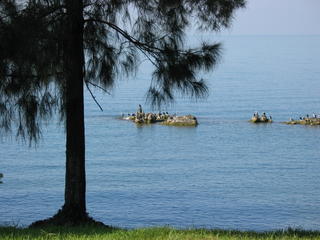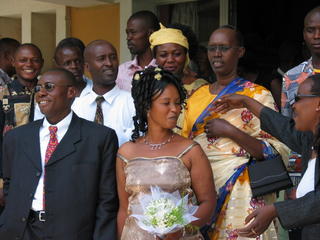Visitors, books, and beautiful places
One of the pleasures of being here is getting to know interesting people. Not just some of the wonderful local staff I work with, but also fellow expatriates who have led fascinating lives elsewhere, and adventurous travellers passing through. This week a young couple from Ireland stopped by the office to learn more about our work, and after chatting for a few minutes I invited them to stay at the house – for the pleasure of having good company (I live alone). We enjoyed a couple of delightful evenings fixing dinner together, relishing the fresh carrots, beetroot, and green peppers from my garden, and talking about their travels, Ireland, and life in Rwanda. They are taking the same route (albeit decided on before reading the book) as Paul Theroux in his latest work Dark Star Safari, in which he travels from Cairo to Cape Town. I’ve met several people who’ve read the book, although I’ve yet to meet anyone who really likes it. Yes, he’s a pretty good writer, but can be mean spirited (a bit too honest?) And he has some extremely damning things to say about NGO workers! Maybe some of them are justified, but he makes me determined to “do different” as my diploma from the University of East Anglia says! Before I get side-tracked onto books, my visitors’ travels can be tracked via their website:
www.allaboutafrica.net. I haven’t had a chance to see it yet, thanks to internet access problems at home (nothing new there!), but am looking forward to taking a look.
Another good book with a focus on east Africa is Aidan Hartley’s The Zanzibar Chest. Hartley is an astonishingly good writer, with among the most eloquent powers of description I’ve ever come across. He was born in Kenya and lives there now, and in the late 80’s and 90’s was a journalist covering wars in places like Ethiopia, Somalia, and Rwanda. His writing is so powerful that I have to taste it in small pieces, so I’m only half-way through the book. In addition to writing about his life as a correspondent, he also writes lovingly about his childhood in east Africa, his parents, and his father’s work in Yemen.
As an antidote to Hartley, I’m also reading (for the second time) Bird by Bird: Some Instructions on Writing and Life by Anne Lamott. Her frankness is hilarious, and along with some good advice on how to write, her stories about the agonising difficulties of getting words onto paper also turn into advice about taking a lighter view of life. I recommend it to everyone, aspiring writer or not!
I shall end this piece with photographs of a beautiful place where I spent a couple of days working last week. At the end of each month our various programmes gather for a day to present reports of our work during that month. At the end of each quarter we hold a one and a half or two day meeting to present more in-depth reports, learn about new policies, and discuss other issues. This quarter it was my team’s turn to make the meeting arrangements. A few miles outside of Butare there are, quite close to each other, a convent and a monastery, both offering meeting facilities. Both are set in beautiful grounds, wonderfully peaceful, filled with ancient trees, flowering bushes of bougainvillea, trim lawns, and colourful borders. We chose the monastery, whose gardens you can see in the photographs below. Imagine the peace and enjoy!






